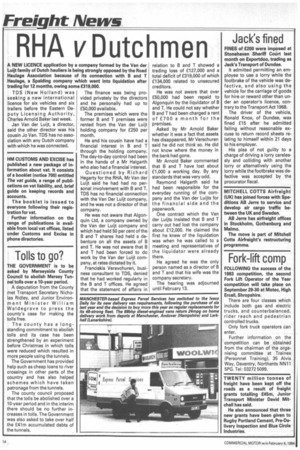RHA vDutchmen
Page 16

If you've noticed an error in this article please click here to report it so we can fix it.
A NEW LICENCE application by a company formed by the Van der Luijt family of Dutch hauliers is being strongly opposed by the Road Haulage Association because of its connection with B and T Haulage, a Spalding company which went into liquidation after trading for 12 months, owing some £319,000.
TDS (New Holland) was seeking a new international licence for six vehicles and six trailers before the Eastern Deputy Licensing Authority, Charles Arnold Baker last week.
Jan Van der Luijt, a director, said the other director was his cousin Jo Van. TDS has no association with any Dutch company with which he was connected. The finance was being provided privately by the directors and he personally had up to £50,000 available.
The premises which were the former B and T premises were rented from the Van der Luijt holding company for £250 per month.
He and his cousin have had a financial interest in B and T through the holding company. The day-to-day control had been in the hands of a Mr Halgarth who also had a financial interest.
Questioned by Richard Hegarty for the RHA, Mr Van der Luijt said he had had no personal involvement with B and T. TDS has no financial connection with the Van Der Luijt company, and he was not a director of that company.
He was not aware that Algonquin Ltd, a company owned by the Van der Luijt company and which had held 50 per cent of the B and T shares had held a debenture on all the assets of B and T. He was not aware that B and T had been forced to do work by the Van der Luijt company, at rates dictated by it.
Franciskis Veravchuren, business consultant to TDS, denied that he had worked regularly in the B and T offices. He agreed that the statement of affairs in relation to B and T showed a trading loss of £127,000 and a total deficit of £319,000 of which £134,000 related to unsecured creditors.
He was not aware that over £50,000 had been repaid to Algonquin by the liquidator of B and T. He could not say whether B and T had been charged a rent of £700 a month for the premises.
Asked by Mr Arnold Baker whether it was a fact that assets has disappeared, Mr Verschuren said he did not think so. He did not know where the money in the bank had gone.
Mr Arnold Baker commented that B and T have lost about £1,000 a working day. By any standards that was very odd.
Raymond Halgarth said he had been responsible for the everyday running of the company and the Van der Luijts for the financial side and the paperwork.
One contract which the Van der Luijts insisted that B and T carry out had lost the company about £12,000. He claimed the first he knew of the liquidation was when he was called to a meeting and representatives of the liquidator were already there.
He agreed he was the only person named as a director of B and T and that his wife was the company secretary.
The hearing was adjourned until February 13.
































































































